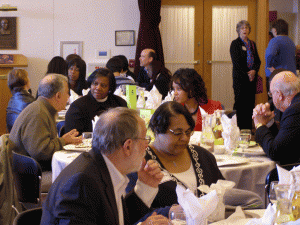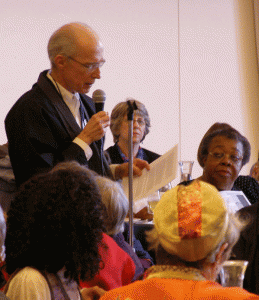Spiritual leaders from Jewish, Methodist, Buddhist, Baha’i and Islamic traditions co-host seder at Mount Zion
By ERIN ELLIOTT /Â Community News Editor
Rabbi Amy Eilberg began Sunday’s Interfaith Passover Seder with a rather unorthodox question: “Is there a table that has an extra Jew?”
Amid chuckles, Eilberg explained that the purpose of the seder was to split up and for people to sit with others they did not know. Each table was supposed to have at least one Jewish participant, who could explain the seder and facilitate discussions.
The interfaith seder, which took place March 29 at Mount Zion Temple in St. Paul, was led by Eilberg and co-hosted by Rev. Debra Jene Collum, United Methodist; Zafar Siddiqui, director of Islamic Resource Group; Ken Ford, Clouds in Water Zen Center in St. Paul; and Lequetta Diggs, Baha’i Community. The event was sponsored by SPIN (St. Paul Interfaith Network), which is affiliated with and hosted by the Saint Paul Area Council of Churches (SPACC).
Music was provided by Billy Perkiss, a member of Shir Tikvah and teacher at Washburn High School, who opened the event with “Hinei Ma Tov.”
Eilberg began by explaining the significance of the seder and invited the approximately 180 guests to participate as fully as they wished.
“The seder is perhaps the most beloved of all Jewish rituals, and the most widely observed,” she said. “It relates to a particular story in the history of the Jewish people and any people who are oppressed.”
Eilberg then invited those who were able to speak the words “Let all who are hungry come and eat” in a language other than English. The phrase was spoken in 13 other languages, including Hebrew, Swahili, Persian and Chinese.
Someone from each table was appointed to read a portion of the Haggada and there were several opportunities for group discussions.
Collum, who represented United Methodist, encouraged each table to think of a time when they have been seen as “the other” or when they have experienced “the other” as threatening.
“Imagine a world free of ‘the other,’” she said. “For the enemy is only a person whose story we have not yet heard.”
Throughout the evening, the seder’s co-leaders offered reflections from their own religious traditions on the Exodus and how it relates to liberation.
“I am asked to love my neighbor as myself because my neighbor is myself,” Ford said of his Buddhist tradition. “Perhaps this is the path to liberation.”
Diggs explained that members of the Baha’i faith honor the teachings of all the prophets of God — Jesus Christ, Buddha, Muhammad and Moses, among others.
“All prejudices between man and man are falsehoods and are against the will of God,” Diggs said. “God is love.”
Siddiqui noted that in Islam, Moses is known as “Moses who spoke to God” and is mentioned 136 times in the Koran. He also spoke of Islam’s Day of Ashura, in which Muslims fast to remember Moses taking his people out of Egypt.
“In Islam, we believe that God is infinitely just,” Siddiqui said. “Wherever there is oppression, God’s punishment can come at any time — in a just way. God always hears the cries of the oppressed.”
Siddiqui then recounted the story of Moses and the Burning Bush — as it appears in the Koran, which differed only slightly from the Torah version.
“That sounded very familiar to those who know the story of the Burning Bush,” Eilberg said. “And it’s a metaphor for the whole interfaith experience.”





















